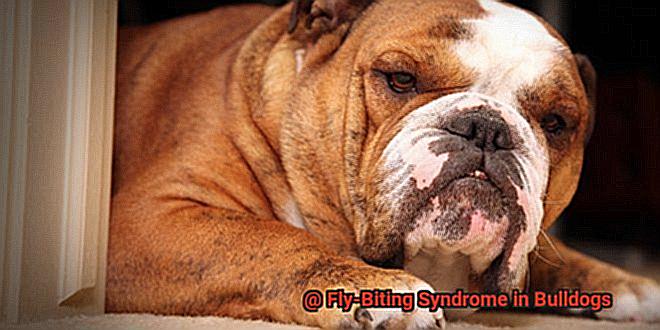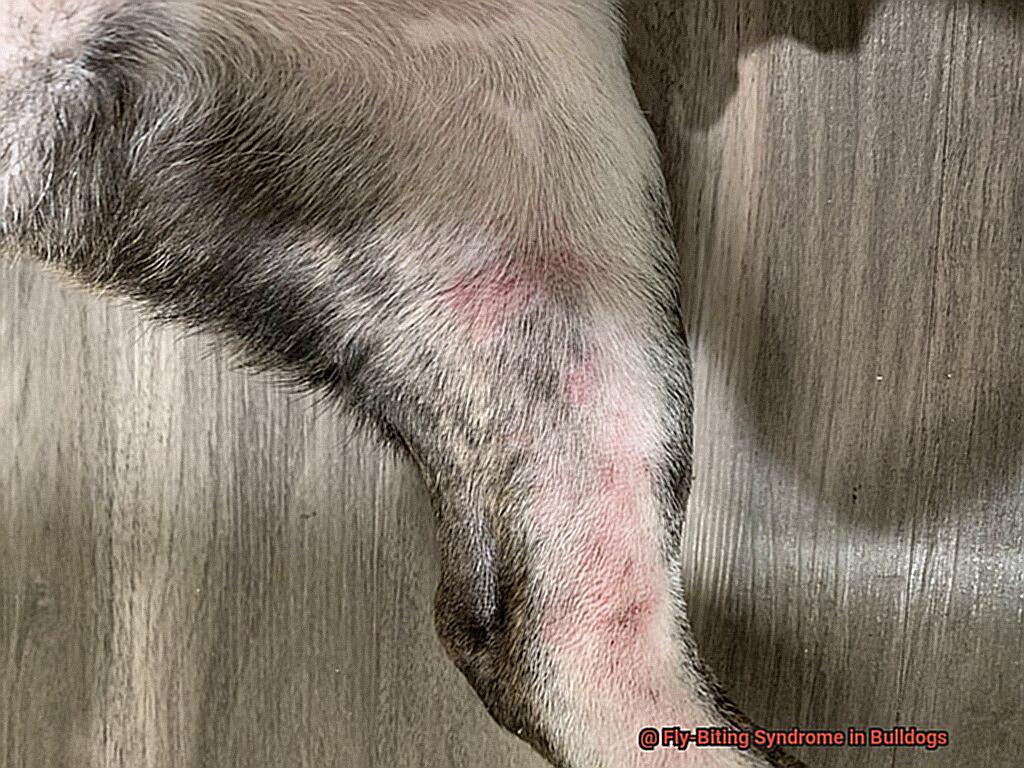Fly-Biting Syndrome in Bulldogs?
Do you have a bulldog that snaps at the air as if it’s biting something? Fly-Biting Syndrome in Bulldogs is more common than you’d expect.
In this blog post, we’ll explore what causes this condition, how to recognize it, and what therapy options are available.
We’ll also discuss how to prevent fly-biting syndrome in bulldogs so your dog can stay happy and healthy.
If you’re curious why your bulldog is acting strangely, read on to learn more about fly-biting syndrome in bulldogs.
Symptoms of Fly-Biting Syndrome in Bulldogs
Contents
- 1 Symptoms of Fly-Biting Syndrome in Bulldogs
- 2 Causes of Fly-Biting Syndrome in Bulldogs
- 3 Diagnosis and Treatment of Fly-Biting Syndrome in Bulldogs
- 4 Prevention of Fly-Biting Syndrome in Bulldogs
- 5 Lifestyle Changes to Reduce the Risk of Fly-Biting Syndrome in Bulldogs
- 6 Diet and Nutrition to Prevent Fly-Biting Syndrome in Bulldogs
- 7 Training Tips to Help Your Bulldog Overcome Fly-Biting Syndrome
- 8 When to Seek Veterinary Assistance for Your Bulldog’s Fly-Biting Syndrome
- 9 Conclusion
Fly-Biting Syndrome in Bulldogs is a worrying behavioral condition that can leave pet owners feeling helpless. This condition, characterized by a dog compulsively biting at the air as if chasing flies, can be caused by stress, boredom, or other environmental factors.
If you suspect your bulldog has fly-biting syndrome, there are some telltale signs to watch for.
These include excessive panting and drooling, pacing, barking, and whining, snapping at imaginary objects or the air around them; and compulsive licking and chewing on themselves or objects around them.
It’s important to note that fly-biting syndrome in bulldogs can also be a sign of an underlying medical condition such as allergies or thyroid issues.

If the behavior persists for more than a few weeks, it is essential to take your bulldog to the vet for a checkup.
Your veterinarian will be able to diagnose any underlying medical conditions that need to be addressed and provide treatment options if necessary.
While fly-biting syndrome may seem like a minor problem at first glance, it can actually be indicative of more serious issues.
Causes of Fly-Biting Syndrome in Bulldogs
Fly-biting syndrome in bulldogs can be a perplexing condition, but don’t worry—we have the answers! There are several potential causes for this disorder, including environmental stressors, physical health issues, and neurological disorders.

Environmental stressors can include anything from a new pet or family member in the home to loud noises or bright lights. Physical health problems such as skin allergies, ear infections, and dental issues can also lead to fly-biting syndrome in bulldogs.
Neurological disorders like epilepsy and canine compulsive disorder (CCD) may also contribute to FCD. In some cases, a combination of these factors is responsible for fly-biting syndrome in bulldogs.
If your bulldog is exhibiting signs of fly-biting syndrome, it’s important to consult with your vet to determine the best course of treatment for your pup.
Diagnosis and Treatment of Fly-Biting Syndrome in Bulldogs
Fly-biting syndrome in bulldogs is a serious condition that can cause your pup to bite at imaginary flies or other items. If you suspect your bulldog is suffering from this disorder, it is essential to have them evaluated by a veterinarian.
The diagnosis typically involves a physical examination and neurological testing, although other tests such as blood tests, urine tests, X-rays, and CT scans may also be used to confirm the diagnosis.
Treatment of fly-biting syndrome in bulldogs usually involves behavioral modification techniques such as desensitization and counterconditioning. Medications like antihistamines, anxiolytics, and tricyclic antidepressants may be prescribed to help reduce the urge to bite.
In some cases, surgery may be necessary if the condition is caused by an underlying physical abnormality or injury.
It’s important to remember that fly-biting syndrome in bulldogs can be treated with proper medication and care.
If you think your pup has this condition, consult with your vet immediately so they can provide the best treatment for your furry friend.
Prevention of Fly-Biting Syndrome in Bulldogs
Fly-biting syndrome is a behavioral disorder that can affect bulldogs, but it’s preventable with the right training and management.
Positive reinforcement is key to preventing fly-biting behavior in bulldogs, so owners should reward their pups for good behavior and avoid punishing them for bad behavior.
Providing plenty of exercise, mental stimulation, and socialization can help keep fly-biting syndrome at bay.
Taking your pup for regular walks and playing interactive games with them can help keep them physically and mentally fit. Introducing them to new people and animals can also help make them feel more comfortable in social situations.
It’s also important to keep the environment free from potential triggers such as loud noises or sudden movements that could cause the fly-biting behavior to occur.
If you suspect your bulldog has fly-biting syndrome, it’s best to consult your veterinarian, as there may be an underlying medical condition causing the behavior.
Lifestyle Changes to Reduce the Risk of Fly-Biting Syndrome in Bulldogs
You may be familiar with fly-biting syndromes. This condition is caused by a combination of genetics, environmental factors, and lifestyle. Fortunately, you can reduce your dog’s risk of flybite by making a few simple lifestyle changes.
Regular exercise is essential for reducing stress and anxiety, two major contributors to fly-biting behavior. Make sure to give your dog plenty of physical activity each day—walks, playtime, or even doggie daycare can all help.
Mental stimulation is also important for keeping your pup’s mind occupied and preventing boredom; puzzles and games are great ways to provide this.
Socialization is also key for helping your bulldog become more comfortable with people and other animals. Taking them to the park or signing them up for doggie daycare can help with this.
Finally, providing a safe environment with appropriate toys and chews will give your pup something else to chew on besides flies.
These small lifestyle changes can make a big difference when it comes to reducing the risk of fly-biting syndrome in bulldogs.
Diet and Nutrition to Prevent Fly-Biting Syndrome in Bulldogs
Are you worried that your bulldog may be suffering from fly-biting syndrome? Diet and nutrition can be a great way to help prevent this condition.

Bulldogs need a diet that is high in protein, low in fat, and contains all the necessary vitamins and minerals for optimal health.
Make sure they have plenty of fresh, clean water every day, and avoid giving them any food or treats that contain artificial ingredients or preservatives.
Exercise is also important for keeping your bulldog fit and active. Take them for walks or play fetch in the backyard. It’s important for their physical and mental wellbeing.
Before changing your bulldog’s diet or adding any supplements to their routine, it’s always a good idea to consult with a veterinarian first.
Training Tips to Help Your Bulldog Overcome Fly-Biting Syndrome
Fly-biting syndrome can be a difficult behavior to manage in bulldogs, but with patience and dedication, it is possible to help your pup overcome this issue. Here are some tips to get you started:
Start with Basic Obedience Commands
Establishing a strong foundation of trust between you and your bulldog is the first step. Teach them basic commands such as sit, stay, come, and down so that they understand what is expected of them and can more easily follow your instructions.
Introduce Specific Commands Related to Fly-Biting
Once your bulldog has mastered the basics, begin introducing more specific commands, such as “stop” or “leave it,” so that they know what to do if they see a fly or other object in the air.
Reinforce Positive Behavior
Rewarding your pup with treats or verbal praise when they follow these commands will help reinforce the desired behavior and make it easier for them to understand what is expected of them.
Establish a Regular Routine
Having a regular routine for your bulldog can help them learn how to control their energy levels rather than resorting to fly-biting habits out of boredom or frustration.
Provide a variety of mentally stimulating activities
Offering mental stimulation activities such as puzzle toys or interactive playtime with other dogs or people can assist your bulldog in releasing energy rather than resorting to fly-biting behavior out of boredom or frustration.
Consult a Professional Trainer if Needed
If needed, consult a professional trainer who specializes in working with dogs with behavioral issues such as fly-biting syndrome so that they can provide additional tips and guidance.
When to Seek Veterinary Assistance for Your Bulldog’s Fly-Biting Syndrome
If your bulldog is suffering from fly-biting syndrome, it’s time to seek veterinary assistance. This behavior can be a sign of an underlying medical condition such as epilepsy or allergies and should always be evaluated by a qualified vet. In addition, your vet may want to check for any parasites that could be causing the fly-biting behavior.
If the cause of the syndrome cannot be determined, medications may be prescribed to help control the behavior. In more extreme cases, surgery may even be necessary to correct any physical abnormalities that are contributing to the fly-biting.
No matter how severe or long-lasting your bulldog’s fly-biting syndrome is, it’s important to seek professional advice from a veterinarian. They will have the knowledge and experience needed to provide your pet with the best possible care and keep them healthy and happy.
Also Read: Do all English Bulldogs Have Underbites?
Conclusion
Fly-biting syndrome in bulldogs can be a frightening condition, but it doesn’t have to take over your pup’s life.
With the right knowledge and preventative measures, you can help your bulldog lead a happy and healthy life.
Be sure to recognize the symptoms, make lifestyle changes, modify their diet, and use training tips. If you suspect that your pup is suffering from this disorder, seek medical assistance immediately.




